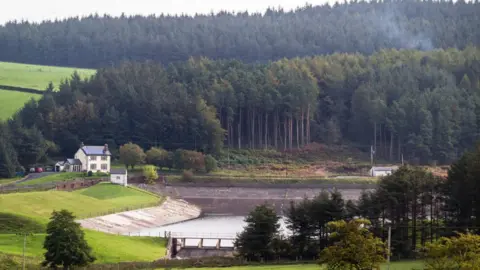Yorkshire Water wants more water from River Ouse
 Getty Images
Getty ImagesYorkshire Water has applied for permission to take more water from the River Ouse to help maintain reservoir levels.
It said the region had experienced below-average rainfall since February and recent falls had been patchy.
It comes as the Environment Agency requested a drought order to protect water stocks in Elslack Reservoir, near Skipton.
The agency said much of England remained in drought conditions.
Yorkshire Water, which imposed a hosepipe ban in August and this week admitted it expected the measure to continue into 2023, said experts predicted September would see less than 65% of expected rainfall.
It said the River Ouse in North Yorkshire was an important part of its water resources and a drought permit would help support stock and drinking water production.
Granville Davies, clean water and catchment strategy manager at Yorkshire Water, said: "Although we have had some intermittent rainfall, reservoir levels are still significantly below where we would expect for this time of year and are only around a third full."
 Peter McDermott/GEOGRAPH
Peter McDermott/GEOGRAPHThe company's application follows a meeting of the National Drought Group on Wednesday, which said while essential supplies of water remain safe, reservoirs across the country continue to be at lower levels than usual.
The group, made up of water firms, the Environment Agency, the government and other agencies, said the drought was expected to continue into 2023.
The Environment Agency (EA) said its application for a drought order at Elslack Reservoir, at Elslack Beck near Skipton in North Yorkshire, would have no impact on drinking water supplies.
If granted, it would mean Yorkshire Water would be required to reduce the flow of water from the reservoir into the beck.
A similar order was made for Holme Styes reservoir in West Yorkshire in August.
Richard Maxted, from the EA, said the order would protect habitats and wildlife.
"Without it, the reservoir could run dry and wildlife and the environment will suffer.
"It's an example of the action we have been taking all summer and continue to take as the drought conditions continue to put pressure on the water environment."

Follow BBC Yorkshire on Facebook, Twitter and Instagram. Send your story ideas to [email protected].
